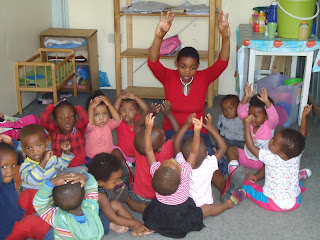Ladder to Literacy Blog
So many amazing moments has occurred since the day Niki walked through the
ELF door in 2012. Niki is from an organisation called Ubomi and she approached us
in her quest to find materials for the schools she provides aid to. These schools
exist in townships on the fringe of Cape Town in two areas called Samora Machel
and Kosovo. We partnered on the “Nurturing the Spirit of Learning in Kosovo”
project last year. Our partnership has brought much inspiration, friendship,
challenges, opportunities and development of human potential.
This year we embarked on the Ladder to Literacy project. Our focus is to provide the teachers in "Nurturing the spirit of Learning in Kosovo" project with teaching skills in how to teach literacy to young children in their schools. The Literacy
workshops will run over five sessions meeting once a week in Samora Machel.
Session One:
A warm sunny winter’s day in the townships. I approach the Tsonga
environmental centre in Samora Machel, as I take the corner I see some school children making
their way to school. I meet Mandisa, my co facilitator. We empty the boot of my
car with all the equipment we’ll need and we head inside to set up. I was
amazed at the beautiful architectural structure of the building and surprised I
haven’t noticed it before as I’ve driven past it so many times on my way to
Kosovo.
Once all the teachers had arrived
we started our introduction to Literacy, what literacy is and why it is important.
We spoke about the natural universal way children learn their native language,
the teachers could relate to this, sharing experiences of their own children.
We moved onto ways to help children develop literacy, with Mandisa translating
as we went along. After our tea break we demonstrated pre literacy vocabulary enrichment
activities which the teachers got to practice.
The activities were done in Xhosa
and we had a hiccup when it came to the ‘I spy’ game, as I’ve discovered that most of the Xhosa
words begin with an ‘i’…..ihagu, ikama, ikati
and so forth.
After the practice session the
teachers head off to the tables to make literacy materials for the children in
their schools. This was a huge challenge for the teachers as their lines were skew;
they struggled to cut strait and even paste straight. Many had to redo and
needed close guidance to perfect their material making skills. Patience is virtue.
When asked who read every day, only
two of the fifteen teachers raised their hands, I assumed that the others only
read every now and then. When I asked why not, they replied that they did not
know the importance of reading to children and they did not have any books. We
ended our session with a word of encouragement to read to children every day.
Going home to my three children
this very afternoon, I pondered on how fortunate they have been to have such a
sure start in life to literacy. And I realized the ever more importance of this
Ladder to Literacy project for the children in Samora Machel and Kosovo.











